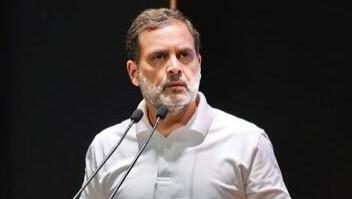
Will Blacken Rahul’s Face for Savarkar Insult: Sena (UBT) Leader
The political landscape of India is always rife with controversy, and the latest dispute to emerge is between the Shiv Sena (UBT) and the Congress party. A senior leader of the Shiv Sena (UBT) in Nashik, Bala Darade, has sparked outrage by threatening to blacken the face of Congress leader Rahul Gandhi for his alleged “derogatory” remarks about freedom fighter VD Savarkar.
The controversy began when Rahul Gandhi, during a rally, referred to Savarkar as a “Mafi-veer” (mafia warrior), which was seen as an insult by many. Savarkar, a key figure in India’s independence movement, was also the founder of the Hindu nationalist movement, the Rashtriya Swayamsevak Sangh (RSS).
Darade, who is a prominent leader of the Shiv Sena (UBT) in Nashik, was addressing a gathering when he made the bold statement. “I will blacken Rahul’s face for his insulting remarks about Savarkar,” he declared. “Rahul’s statement about Savarkar was derogatory, and he should apologize for it.”
The Shiv Sena (UBT) has since distanced itself from Darade’s comments, saying that they were his personal views and not representative of the party’s stance. However, the Congress party has taken strong exception to Darade’s threat, with Maharashtra Congress President Harshwardhan Sapkal terming it as “cowardly.”
Sapkal accused Darade of using “goondaism” to silence opposition voices. “This is a manifestation of the RSS and the Shiv Sena’s (UBT) intolerance towards dissenting voices,” he said. “By making such threats, Darade is only showing his own cowardice and inability to engage in a constructive debate.”
The controversy has sparked a heated debate on social media, with many taking to Twitter to express their outrage and shock at Darade’s threat. Some have accused the Shiv Sena (UBT) of promoting a culture of violence and intimidation, while others have defended Darade’s right to express his opinion.
The Congress party has also demanded an apology from Rahul Gandhi for his alleged insult to Savarkar. “Rahul Gandhi’s statement was not only an insult to Savarkar, but also to the entire nation,” said a Congress spokesperson. “He should apologize for it and retract his statement.”
The Bharatiya Janata Party (BJP), which is a key ally of the Shiv Sena (UBT) in Maharashtra, has also weighed in on the controversy. “Rahul Gandhi’s statement was an insult to Indian history and culture,” said a BJP spokesperson. “We demand an apology from him for his derogatory remarks about Savarkar.”
The controversy is the latest in a series of disputes between the Shiv Sena (UBT) and the Congress party in Maharashtra. The two parties have been bitter rivals for many years, and their animosity has only grown more intense in recent months.
The dispute over Savarkar’s legacy has been a sensitive issue in Indian politics for many years. While some see him as a hero who fought for Indian independence, others view him as a divisive figure who promoted Hindu nationalism and was involved in the assassination of Mahatma Gandhi.
The controversy has also sparked a debate about the role of freedom fighters in Indian politics. Some argue that freedom fighters should be revered and respected, while others believe that they should be held accountable for their actions during the freedom struggle.
In conclusion, the controversy surrounding Darade’s threat to blacken Rahul Gandhi’s face has sparked a heated debate on social media and in Indian politics. While some have defended Darade’s right to express his opinion, others have condemned his threat as an attempt to intimidate and silence opposition voices.
Regardless of one’s views on the controversy, it is clear that the dispute highlights the intense political polarization in India today. The country is facing many challenges, from economic inequality to social unrest, and the political class needs to work together to address these issues.
The controversy also raises important questions about the role of freedom fighters in Indian politics. Should they be revered and respected, or should they be held accountable for their actions during the freedom struggle?
Ultimately, the controversy is a reminder of the need for greater civility and respect in Indian politics. Political leaders must avoid using inflammatory language and instead focus on finding common ground and working together to address the country’s challenges.






